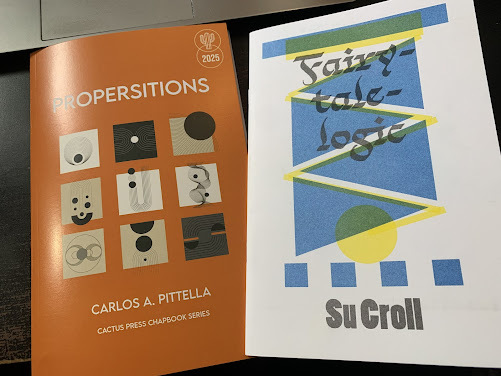Ongoing notes: mid-May, 2025 : Carlos A. Pittella + Su Croll,
 You are keeping track of the above/ground press substack, yes?
I mean, I’m notattempting to post there too often, but I am running a new series of authorspotlights once a month or so. Who might be number three?
And the ottawa small press book fair is but weeks away!
And I’m going to keep pushing the above/ground press postal increase sale until you order something(or the sale ends
; whichever comes first).
You are keeping track of the above/ground press substack, yes?
I mean, I’m notattempting to post there too often, but I am running a new series of authorspotlights once a month or so. Who might be number three?
And the ottawa small press book fair is but weeks away!
And I’m going to keep pushing the above/ground press postal increase sale until you order something(or the sale ends
; whichever comes first).Montreal QC: I was very excited to see Montreal-based poet Carlos A. Pittella’s second poetry chapbook in English, PROPERSITIONS (MontrealQC: Cactus Press, 2025), following his English-language above/ground press debut last summer. I’m appreciating Pittella’s play and sense of line break andrhythm, such as the poem “BETWEEN / IN CASE THEY RUN / YOUR LICENCEPLATE” that begins: “Once I broke my front tooth / out of a poem & stillhave the chip / to show—not a great poem but it tasted / like bone it was real Iremember / the pain & the scar-tissue/ of writing it that became my face.” There’s such a lovely propulsion to Pittella’slyrics, one with a stagger and staccato very nicely employed through those linebreaks and spaces. Held as a kind of call-and-response, or Greek chorus, thereare five “properstitions” poems, numbered via Roman numerals, each with a kindof aside or counterpoint follow-up poem. As the poem “PROPER / STITIONS 1” reads:“I wanted to carve my home mine / with a physical word on the wall & beyond/ hope of getting a deposit back / but I wanted my own alphabet since / neitherlandlord nor family / would understand it anyway. Would you?,” the second poem,“FROM / LATIN, / BIBER,” begins: “beer this verb to be anaftertaste / bitterness my father said / you gotta learn how to love / same ascoffee no one likes / at first he thus expounded [.]”
Edmonton AB: It is interesting to see titles by a new Canadianchapbook publisher, Edmonton’s Agatha Press, run by Matthew Stepanic, a presswith exquisitely-designed titles in limited edition. The eighth title through thepress is Edmonton poet Su Croll’s Fairy-tale logic (2025), an assemblageof poems produced in a numbered edition of one hundred copies. The poems in Fairy-tale logic are composed across familiar fairy tale narratives, but across verydifferent perspectives. “Imagine you are a bad mother.” she offers, to open thepoem “Imagine the poison,” “You are an evil step-mother. // Imagine the face inyour magic / mirror announces you can grow // younger if you eat your beautiful/ step-daughter’s heart // boiled and sprinkled with salt.”
Boast
It was a boast that beganthis
whole bouleversé world.
The boastful father’sfalse
claim of his daughter’sskill,
the lie that she couldspin
gold from grass or leaves
or straw. The yellow ofit
transformed. Transformed.
Yet it was the father
who disappears so completely.
In the end, he was noteven
at church to give thisgolden
package of a bride away
to her new master.
Theysay old stories take on the purpose and character of the times they are told,the speaker of those stories, and Croll offers her unique take on a history ofvariations that might never be exhausted. There are multiple examples one cancite over the years through contemporary poetry—from British Columbia poet Ruth Daniell’s TheBrightest Thing (Caitlin Press, 2019), to Louisiana poet Lara Glenum’s SNOW (NotreDame IN: Action Books, 2024) [see my review of such here], Jessica Q. Stark’s Buffalo Girl (RochesterNY: BOA Editions, 2023) [see my review of such here], Katie Fowley’s TheSupposed Huntsman (Ugly Duckling Presse, 2021) [see my review of such here]or even Montreal poet Stephanie Bolster’s Three Bloody Words (above/ground press, 1996;2006)—most of which engage with elements of female agency or lack thereof,throughout so many of at least those European-originated tales (such as popularizedby the Brothers Grimm). There’s a curious way that Croll’s narratives bob andweave in and around and through well-familiar narratives, her own perspectiveproviding either highlight unexplored moments or simply question the narrativeswe’ve all taken for granted. “Why does the king need straw / spun into gold?”the poem “Questions for Rumpelstiltskin” begins, “He’s the king. / Doesn’t theking have all the gold / in the kingdom? Doesn’t the king / have more gold thanhe knows / what to do with?”



